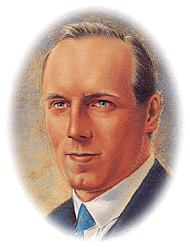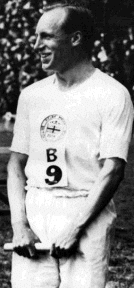Chariots of Fire Hero Honoured in Homeland - China.

What a fitting tribute to a fine Christian...
The residents of a grimy Chinese city paid an unusual tribute yesterday to the Scottish runner Eric Liddell, hero of the film Chariots of Fire. As part of a ceremony marking the 60th anniversary of the liberation of the Japanese internment camp where he died, Chinese officials, old friends and fellow inmates laid a wreath at a memorial marking his grave.
Liddell, a devout Christian, became famous for winning the 400 metres at the 1924 Paris Olympics after refusing to run his best distance, the 100 metres, because the heats were on a Sunday. Less well known is that he was born and spent much of his life in China. The son of missionaries in the port city of Tianjin, he left Britain the year after his Paris triumph to follow in their footsteps as a missionary teacher. "Eric Liddell was a great Olympic champion who gave it all up to come to teach the youth of China," said Stephen Metcalf, 78, a friend and fellow internee.
What was once the Weihsien Internment Camp is now Number Two Middle School in the city of Weifang, and yesterday thousands of children, teachers, residents and city leaders turned out to greet former occupants. More than 2,000 people were held in the camp, including 327 children, mostly from a western-run boarding school nearby. Many were children of missionaries, as were some of the older westerners held there, a fact little mentioned yesterday.
The huge missionary presence in China at the time is still regarded as a symbol of humiliating domination by western powers. Nevertheless, the two dozen former internees who attended were touched by the ceremony's mixture of thoughtfulness and eccentricity. At its climax, to a fanfare of the Star Wars theme tune, fireworks exploded into miniature parachutes, representing the American servicemen who jumped from a B24 bomber to liberate the camp on Aug 17, 1945. Then, 1,500 pigeons were released, one for each of the inmates.
An exhibition hall showing photographs of the camp, and a garden of remembrance containing sculptures and the names of all those held, were also opened. For many of the children, nearly all separated from their parents, Liddell became a father figure. As well as teaching classes, he ran a Sunday school and organised sports competitions. He eventually came round to the idea of sports on Sundays, refereeing football matches after hearing that teenagers with little to do were getting into trouble.
"He gave me two things," Mr Metcalf said. "One was his worn-out running shoes." It was winter, and like many boys Mr Metcalf had nothing to wear on his feet. "The best thing he gave me was his baton of forgiveness. He taught me to love my enemies, the Japanese, and to pray for them." After the war, Mr Metcalf spent 40 years as a missionary teacher in Japan.

Liddell died of a brain tumour in the camp hospital on Feb 21, 1945. "We all trailed along behind his coffin," remembered another former inmate, Estelle Cliff Horne. "My brother was one of the pall-bearers, and we buried him just by where the ceremony was."
The camp had been a mission school for Chinese children, and several of the buildings, including the hospital wing, are still standing. The Liddell memorial was erected by Edinburgh University, where he studied, after China re-opened to the world. After the Japanese left, the camp's history was quietly forgotten within China. During the Chairman Mao years, it was not politically correct to talk of having helped the foreigners. Now the wheel has come full circle, and those who smuggled food into the camp are also honoured in the exhibition hall.
Christian missionaries are also returning. Though missionary activity is formally banned, there are believed to be hundreds working under the guise of charity volunteers and teachers in China today.
Gone, but not forgotten!
GBYAY

<< Home